#gritty spy fiction
Explore tagged Tumblr posts
Text
When a man has nothing to lose, he's Disposable.

View On WordPress
#1960s adventure novel#1960s spy thriller#action-packed adventure#aviation action#CIA black ops#classic military thriller#classic pulp fiction#Cold War espionage#Cold War intrigue#comedy#covert missions#double agents#elite operative#fantasy#fast-paced thriller#fighter pilot hero#gritty spy fiction#hard-hitting action#high-stakes adventure#international espionage#military espionage#military intelligence#military scifi#page-turning suspense#paranormal romance#retro spy novel#rogue operative#science fiction#scienceficiton#scifi
1 note
·
View note
Text
@give-to-oblivion: Are these movies having a metatextual argument with the James Bond franchise about spy fiction? I feel like if they are Ethan's chances of survival go up and retirement becomes the more satisfying ending.
oh good gd yes. i remember when i was in the thick of MI Deep Think, i tried to watch Skyfall bc yanno it's supposed to be the Best Bond Movie and I fucking stopped watching because I couldn't fucking stand it.
like, in Dead Reckoning, Ethan literally says the thesis out loud (Ethan: Your life will always matter more to me than my own. Grace: You don't even know me. Ethan: What difference does that make?) but it's woven into all of the movies McQ has touched (so Ghost Protocol onward). like just the MAJOR examples here:
in Rogue Nation, the big bad hooks Ethan by killing a bystander in front of him, which gets Ethan to basically go MIA and chase the Big Bad for six fucking months.



AND LATER IN THE SAME MOVIE, Big Bad (Solomon Lane, great name) kidnaps Benji
so Ethan proceeds to abduct the British Prime Minister to get the MacGuffin Lane wants so he can get Benji back
the entire point of Fallout is that Ethan is so incapable of accepting collateral damage, he lets terrorists get ahold of nuclear material instead of losing one person.


Which is then compounded in the scene where he nearly blows the entire mission bc one person catches them. And instead of shooting her or knocking her out, he pleads with her to walk away.
while James Bond is gritty and pessimistic and misogynistic, MI is about a group of people who become so dedicated to the preservation of life, they reject the Trolley Problem and will do anything to push the thing off the tracks. even if they fail in the end, it's better than the idea of Acceptable Losses. no loss is acceptable.
uuuuuugh this last movie is gonna fuck me up.......
57 notes
·
View notes
Text
Just finished reading Absolution, and something about the way Vandermeer casually switches between (almost) mundane gritty spy fiction and deeply unsettling horror scenes and back again is fascinating to me. I'll need to chew on it longer because I know I missed things, but goddamn the imagery. Also the last section has some fantastic chapter titles, shout out to "Not Enough Fucked-Up Stuff in Barrels" and "Two Men in a Fucking Boat Thing".
Anyway, guess I'm off to reread the rest of The Southern Reach again, because that's all my brain wants to think about for the moment.
25 notes
·
View notes
Note
Will my novel still count as YA if both my main protagonists are 21 years old?
YA with 21-Year-Old Protagonists?
The short answer is: probably not.
The long answer is: It's complicated, and here's why...
"Young Adult" isn't a genre but an age category that was created by librarians in the 1960s to help teenage readers find books that served as a transition between children's literature and adult literature.
Today, YA is still an age category, but it's used to classify books that are specifically written with appeal to young adult readers. Which isn't to say older and younger readers can't read and appreciate them (they can and do... a 2012 study found that 55% of YA readers were adults), it's just that the publisher feels the book will appeal broadly to young adult readers.
There are two main criteria for a YA novel:
-- protagonist is typically between the ages of 14 and 18 -- protagonist broadly experiences "coming of age" issues
In order to qualify as YA, at least one of the above has to be true. However, someone above the age of 18 is unlikely to broadly experience young adult "coming of age" issues, so it's rare to see YA protagonists much older than 18.
Young adult "coming of age" issues are things like: first romantic relationships, growing apart from childhood peers, first forays into independence from family, struggling to fit in or fighting with individualism, first generation cultural conflict with immigrant parents, etc.
So, it's not that someone over the age of 18 can't experience any of those issues--many do--it's just that they're not usually going to experience them as broadly as the average 16-year-old.
Enter the "New Adult" age category, which is like YA but for readers and protagonists between the ages of 18 and 25. While there can be some overlap between the experiences of "young adults" and "new adults," most new adults have moved beyond the typical teen "coming of age" issues and are dealing more with things like preparing for life beyond high school and college, first long-term serious relationships, first foray into a career, living away from family for the first time, engagement and marriage, etc. NA romantic fiction tends to be spicier than YA romantic fiction, but it's by no means a requirement of NA--contrary to popular belief.
Adding to the complexity of the issue is YA genre fiction, which almost always features protagonists who should be older than 18 and were probably written as older than 18, and as such are dealing with more adult issues than their YA counterparts. Rather than dealing with things like first-love or going out for cheer leading, YA genre protagonists are usually taking down corrupt organizations in gritty far-future or alternate world cities, preparing for war on a planet populated with dragons, fighting in a deadly competition sponsored by a dystopian government, or rebelling against a villainous monarch in a fantasy world. There's sometimes a little overlap with YA issues like first love, fighting for individualism, first-time independence, but for the most part these characters are dealing with more adult issues and situations. Unfortunately, since traditional publishers have yet to embrace the New Adult age category, protagonists between the ages of 18 and 25 in genre fiction are often aged down to below 18, which is why we have YA novels where 16-year-old princesses in arranged marriages, 17-year-old war-grizzled space captains, and 18-year-old gang leaders with prolific spy networks and a reputation that strikes fear into the hearts of powerful people. It's a little silly, but here we are...
And then there's adult literary fiction, which is character-driven fiction that deeply explores the human condition in a way that emphasizes style over plot. Literary fiction sometimes includes young adult protagonists--and they sometimes deal with "coming of age" issues--but the story isn't really about that. Examples would be things like Life of Pi, The Kite Runner, The Bear and the Nightingale, The Boy in the Striped Pajamas, and The Catcher in the Rye.
So... in regard to your story... If your story is genre fiction--meaning it's plot-driven or plot and character-driven and fits into an obvious genre like science fiction or romance--and your 21-year old protagonists don't broadly experience "coming of age" issues, your book would just be categorized as mainstream genre fiction. If your story is genre fiction and your 21-year-old protagonists do broadly experience "coming of age" issues, it's possible your book would be categorized as YA, but it's far more likely you would be asked to age them down to 18 or younger. And if your story is character-driven fiction that deeply explores the human condition in a way that emphasizes style over plot, your story will probably be categorized as literary fiction.
I hope that helps! ♥
•••••••••••••••••••••••••••••••••
I’ve been writing seriously for over 30 years and love to share what I’ve learned. Have a writing question? My inbox is always open!
Learn more about WQA
See my ask policies
Visit my Master List of Top Posts
Go to ko-fi.com/wqa to buy me coffee or see my commissions
102 notes
·
View notes
Note
<SPOILERS FOR DERIN'S EXCELLENT SCIENCE FICTION STORY BLOG THING TIME TO ORBIT: UNKNOWN WHICH YOU SHOULD GO READ RIGHT NOW IF YOU LIKE MYSTERIES, ETHICAL DILEMMAS, LITERALLY ANY FIELD OF SCIENCE, SOCIAL COMMENTARY, GRITTY SPACESHIP SURVIVAL, AND/OR BEING STABBED OVER AND OVER IN THE AMYGDALA>
god fucking dammit derin. you introduced a character named "Pterra." and i got so excited because that's such a beautiful name and ITS SPELLED LIKE MINE D': which validates the unorthodox spelling somehow and then you abruptly and gruesomely killed her in front of me :(( which i should have seen coming because you basically stated it was going to happen but :((((( i was already looking forward to having Pterra on the crew for the rest of the story and my dreams were shattered LIKE HER SKULL this is why nobody trusts you. it all makes sense now SEE I KNEW IT I KNEW THEY WERE TOO LUCKY WITH REVIVALS I KNEW IT uuuuuuhhhh oh this is not good how is this both the Martian and Among Us. what have you created??? i hate to sound so cliche but what the fuck is wrong with you she asks them to play cards ;~; and they starts crying bc their friends still trust them and all they wants to do is play cards with their friends 😭and they was literally just interrogating them for murder 😭😭😭 i cannot handle this rn aaaaaaaand the surgery spy camera came up again because OF COURSE IT DID it wasnt a red herring at all you fucking liar every single time this man says a line i want to kill him myself why is he still here oh he died offscreen thats convenient. not even mad honestly AUTHORIZED BY WH- oh yeah obviously. yeah that makes sense. why didn't ke think of that sooner. they figured out that the chip was in his arm like a year ago. it was plot relevant. dumbasses anyway i cant believe what you did to pterra. you suck. fuck you
If it makes you feel better I can kill more colonists to normalise Pterra's death more
41 notes
·
View notes
Text
really struggling between doing realistic, real-world wound care for a fictional gunshot wound (packing with gauze), OR getting sexy with it (like thematically sexy, writing poetic descriptions of the intimate act of pulling a bullet out and stitching a wound closed)
The stickler in me insists on the less sexy, more realistic option, but I dunno if realism is really what I'm going for? I love the spy genre in part because it is often fantastical. I mean your partner dying and then dramatically returning with a NEW face (54 Below ref) four years later is kinda inherently dramatic and unrealistic, so I don't feel like I have to be married to gritty realism. And to be honest other writers in the fandom probably do that better than I do anyways.
I do a ton of research to get specific models of cars and guns and tons of fiddly little details nobody really cares about, and I have a lot of real-world cold war politics I'm planning to bring into the fic, so maybe I'm obligated to choose realism? Although I think I could argue that being on a mission means they won't necessarily be able to change dressings as often as they should to prevent infection, so stitching the wound closed is a better option than packing it? Or I could just decide to not care because my way is more fun to write.
10 notes
·
View notes
Note
Silly Game Time: When would you say a villain becomes irredeemable?
Short Answer: Never.
Long Answer: It depends on the story, the storyteller, and the themes being explored.
***Rant Incoming***
Fandom discourse around this particular trope (and that's all character redemption is: one specific kind of trope that can be handled an infinite number of ways) kinda baffles me lately. It often seems to assume that all stories are required to impart moral instruction that follows a formula of reward and punishment for characters' virtues and vices; that characters must be reducible to people who are ultimately good or evil, who must then receive their aforementioned reward or punishment accordingly. A very puritan worldview (ugh!). Everything must be black or white, it implicitly asserts; everything must fit into what not-so-coincidentally is a very christian paradigm. It's one of the many taints of so-called purity culture, I reckon.
Also, it's intellectually simplistic and philosophically stultifying (the world and fiction both have nuance, writers and readers shouldn't have to limit our thought processes christian doctrine). Worst of all, though, it's usually straight-up boring. If I wanted to be told how to act (in this case, how to write my stories) or how to think (in this case, how to read other people's stories), I'd go to church, thanks.
Stories can pose moral questions or assert moral messages, sure, but their purpose is fundamentally *to entertain* by recounting a sequence of events and the development of characters. In other words, stories *entertain* by recounting a plot. As such, the worst thing a story can be is boring. And there's a lot of entertainment value to be had in a redemption plot. Imagine a villain changing, coming to regret their actions, suffering remorse for and the consequences of their villainy, trying to be better and do better, grappling with the question of if that's even possible after all they've done, agonizing over how to repair the damage they've caused and how to carry on when repair is impossible. Sounds pretty entertaining to me (or at least it has the potential to be so). Saying a villain is irredeemable, however, is to say that this interesting-sounding redemption plot can't ever happen, and therefore other more formulaic plots must happen instead.
Like I said earlier, it depends on the story, the storyteller, and the themes in the story. Genre conventions can really come into play here, too, because certain genres tend not to have room to explore redemption as a theme (it's just not a subject those kinds of stories can handle adroitly) whereas other genres are practically built for it. Fantasy usually has it both present and important (Star Wars and Steven Universe both feature it prominently), but gritty spy thrillers typically don't.
Anyway, I think that's enough for now. Thanks for coming to my rant, and remember: There's no such thing as a bad trope, only bad writing that doesn't use the trope in a skillful way.
7 notes
·
View notes
Note
1, 18, 23 😁
ooh another contender
What is the first fandom you were a part of?
ok, so. it was the Metal Gear Solid games. however, i didn't know fandom even was a thing, nor that i was doing a thing called writing fanfic, because i had never explored the idea. you see, i was already a professional editor with a master's degree and had always considered writing fiction for fun, and not proper publication, to be frivolous. i thought fiction had to have a purpose and philisophic merit, and blah blah blah etc.
then by chance i happened to pick up a metal gear game (read: saw my partner playing it, said ooh what's that, got hooked and stole the game). that was when that magnificent lunatic hideo kojima opened my eyes to the epiphany that you can literally write whatever you want.
it doesn't have to Have Something to Say. it doesn't have to be yet another gritty, ultra-realist, masturbatory journal about urban life from the perspective of yet another white man. it can be a cold-war era spy story but also with clones and giant bipedal robots, and a trick-shooting teenager and a guy covered in bees, and everyone is flamboyantly gay.
i know that sounds silly, but i had been trained for many years to take fiction so seriously, that it had literally never occurred to me that YOU CAN JUST HAVE FUN. i felt like i was seeing in colors i never knew existed. so the first thing i wrote was some metal gear fanfic which mushroomed into its own entire story universe and gave me the writing bug, forever. now i write a lot of fanfic for whatever strikes my fancy, and other things for publication.
thank you kojima-sensei, you are my hero forever.
18. All-time favorite fanfic?
The Aeneid (The Iliad fandom) by prolific big-name fan Virgil
23. Age when you started reading fanfic?
like six months after i started writing it. this was post-grad school, so you can supplement my age yourself. i ain't tellin.
at that point i had still never posted anything before, and hadn't read anyone else's (i didn't even know where to look, or that such sites existed). as enlightened as i had become about writing, i was still unwilling to READ fandom works, because i liked having my own little stories and ideas.
then i became an editor for a fan zine and had to read a lot of fanfic, at which point i realized that a whole lot of it was far better than most of the horseshit books my publishing house made me edit for actual publication. like. what the hell where are all these talents coming from? why do they do it FOR FREE?? later, someone in the zine told me about ao3 and how to make an account and it was all history.
i love you fandom readers and writers and other creators, you give me life and hope for humanity
thanks for the ask i will be revenged! 🖤
2 notes
·
View notes
Note
What is your favorite Bashir episode and why is it Inter Arma?
Inter Arms Enim SIlent Leges is a good episode, and one worthy of a full episode analysis given its complex themes regarding patriotism and loyalty. It's my favorite of the "serious" Bashir episodes, but it's not my favorite Bashir episode ever. That belongs to the absolutely delightful Our Man Bashir. During many Bashir episodes, his idealism comes into contrast with pragmatism many times such as with O'Brien in Hippocratic Oath. Bashir as a character has a love of espionage, albeit a very romanticized version, and his idealism comes quickly in contrast when he meets the actual nitty-gritty of espionage in Obsidian Order ex-operative Elim Garak and the terrifying fanatical Section 31. Bashir sees it as an adventure, to fight cartoonish supervillains in the holodeck or spar using dialogue with Garak across the lunchtable. Here, like every holodeck episode, the fun and games have real consequences.
Let's get this out of the way first though, this episode is a comedy and it's a very funny one. Bashir is playing a James Bond-esque adventure clearly modelled after the more gonzo offerings from the Roger Moore era. Holodeck episodes can often be used to create completely ludicrous moments that would simply be out of place in a regular episode (Patrick Stewart's noir dialogue, Brent Spiner in an Old West dress). The actors are clearly enjoying the ridiculousness of the plot and play it to the hilt. Avery Brooks is having a ball as Hippocrates Noah as he rants about destroying the world. Nana Visitor gave the worst Russian accent she could and couldn't stop smiling at turning around on the revolving bed while wearing a slinky dress. Just watch as any character, even Andrew Robinson saying the world "molten lava," and watch how much emphasis they're putting on it, to the point where even the protagonists of the episode are hamming it up. When it comes to some creative projects, the fun that the actors are having in the role comes across the screen, and that mood becomes infectious, and Our Man Bashir does that with remarkable gusto.
The opener lets you know that this episode won't be very serious, with Bashir in full James Bond swagger, taking out the evil henchman Falcon with a champagne cork and a one-liner so he can smooch a Bond girl, only to be interrupted by Garak, who has clearly hacked his way into the holosuite to see what Bashir has been doing and relentlessly troll him while doing so. Andrew Robinson has always been a great foil for Alexander Siddiq and the two have great on-screen chemistry in every episode they're in, but this episode really takes the cake with Garak's sarcastic quips to start followed by serious disagreements with to follow. The episode opener even ends with Garak saying: "What could possibly go wrong?" to lampshade how holodeck episodes always are "crew stops in for a little recreation in the holodeck, malfunction happens, hijinks ensue as the fictional becomes real."
Then we have the escalation, where Sisko, Kira, Dax, Worf, and O'Brien all get blown up in a runabout, and their transport patterns are stored in the system computer and routed into the holosuite, turning the characters of Bashir's spy flick into the bridge crew. This is completely BS Star Trek technobabble of course, but it's a clearly transparent framing device to give Bashir and Garak the stakes. They have to continue the holosuite adventure or their friends get dumped from memory and deleted. The holosuite safeties are off, so if any of the characters die, either Bashir or Garak or any of the avatars of the bridge crew taking the characters, then they die for real. It's so blatant it almost feels like a wink and nudge, much as how Kira can't keep from laughing when Bashir, Dax, and O'Brien are shrunk in One Little Ship. Making matters worse, is that several of the characters are scripted to die. Bashir's heterosexual life partner Chief O'Brien becomes his eternal nemesis Falcon. So while O'Brien will play his role and attempt to kill Bashir without a second thought, Bashir can't simply eliminate Falcon because it means terminating Miles. This sets up not only the stakes, but the central conflict between Bashir and Garak: idealism versus pragmatism. Taking out O'Brien is easier, but it means killing him. On the contrast, if Falcon kills Bashir and Garak, the program ends and everyone dies, O'Brien included.
Bashir and Garak continue through the adventure, with Garak frequently commenting on how none of this represents actual espionage work that he performed for the Obsidian Order and that this is all ridiculous nonsense. To Garak, being an operative meant getting his hands dirty and performing morally dubious actions for the good of the state. This is a staple of John le Carre spy fiction and the chief dramatic antithesis of the James Bond motif. In le Carre's works, spycraft was often grossly out-of-sync with the stated moral philosophy of the nation's practicing it, and this is true in our own world, from CIA coups in Central and South America to promote illiberal autocracy to NKVD brutality against the proletariat that they were ostensibly laboring to elevate. To Garak, Bashir's spy program is an insult to the very difficult work that he had to do - Bashir gets a penthouse suite and a sexy valet polyglot genius pilot with a Bond girl name the equal of Pussy Galore or Honey Goodhead, Garak does grunt work as a gardener on Romulus and may or may not have had a hand in the unexplained deaths of multiple Romulans. Garak's life wasn't a fantasy...it was work.
The rest of the spy novel proceeds, with Kira playing the role of KGB vixen Komananov, clearly a stand-in for Russian Bond girls like Tatiana Romanova and Garak as a clearly unwanted plus-one (as Bashir's holoprogram is designed for one participant). They meet Worf as a suave French henchman, where even Michael Dorn's stoic baritone only adds to the comedy. Worf often plays the Straight Man in any scene he's in, but with the added glitz and glamour, he truly pulls off the role of a capable number two man to contrast with Hippocrates Noah's lunacy. This is one of the strengths of the episodes, in taking the characters and using their strengths while getting more than a few to play against type. Dax goes from confident old soul to the naïve Honey Bare, Kira adds a seductive edge while not losing her aggression, and Starfleet Captain Sisko becomes a high-functioning genocidal madman (though given Avery Brook's performance as Joran Dax, it's clear that he can definitely play villains with skillful aplomb). It's this sort of playfulness that maintains the comedy while trusting in the strength of the actors to carry their scene.
Sisko as Noah might be the story's antagonist, but the true conflict in the scene happens with Garak and Bashir as their idealism vs. pragmatism comes to its conclusion. Garak has done a lot of shady business and has accepted that there are casualties in conflicts, and while it's certainly not ideal, in the end it's better to take out some of the bridge crew rather than all of them, and that sometimes you need to cut your losses. While not explicitly stated, chances are good that Garak is remembering intelligence sources that he cultivated that he abandoned when they were discovered. Garak castigates Bashir as living out a shallow power fantasy where he pretends that he's a hero; Garak knows the truth - spies aren't heroes. They do deeply unpleasant work for the benefit of their nation. And so, he says that he'll end the program and save himself, and that Bashir isn't the man he pretends to be and won't stop him.
Bashir refuses to surrender to the obvious choices that Garak and even the program itself asks, as its script demands either Honey Bare or Komananov dies while the other girls gets with the hero. This culminates where to prove his conviction, Bashir shoots Garak non-lethally, proving to Garak that Bashir truly means what he says. In that moment, Garak learns that Bashir was listening to him, that in the course of being a spy, you must sometimes do things that are undesirable and unpleasant in pursuit of the ultimate mission. And so Garak, corrected, can only urge Bashir to "lead on," finally identifying him as a true secret agent, instead of a pretender. In the final climax, Bashir takes Garak's lessons to heart, espousing the need to cut his losses. In a complete twist of the holoprogram's script, Bashir sides with Noah and destroys the world, confusing the actors who genuinely don't expect to win. Bashir knows that the world being destroyed isn't real, only the characters on-screen are, and so he stalls out long enough for everything to be redeemed.
But where Bashir learned from Garak, enough to be a "real" spy to derail the program, Garak also learned from Bashir. About how imagination and playfulness sparks creativity and non-lateral thinking. He offers to join Julian Bashir on his next adventure, and the happy ending is achieved. Idealism is maintained, lines drawn, and the characters grow. If it wasn't for an MGM cease-and-desist, there may have been more spy adventures, but alas, this one was the only one we got on screen, with others only in passing.
It's a highly recommended episode, for my part. It's not the deepest, but it is fun and playful, a good comfort food.
Thanks for the question, Anon.
SomethingLikeALawyer, Hand of the King
24 notes
·
View notes
Note
Your turn! For the Fanfic Author Ask, would you answer #3, 14, 18, 19, 26, 31, and 32?
Oh, man, Marta!! You asked hard ones!
3. In your opinion, what's your best fic?
Is it cheating to declare a tie? I hope not, because I honestly can't choose. I feel like I did my very best writing in both A Mistress to No One - inspired by Benedict Bridgerton's story and written for @hollyethecurious bday in '23 - and In the Viper's Den - inspired by the WWII spy drama Shining Through and written for the @cshistfic event back in '21.
14. What's the biggest change in your taste between when you started in fandom and today?
I'm really not sure there has been much change in my tastes since I joined fandom back in '16. I will say I was surprised how much I was enjoying very dark and gritty and sexy fiction that I never would have considered reading in commercially published books. But that hasn't changed much since joining fandom, so I'm not sure that's really a good answer to your question, but it's all I've got. Sorry!
18. What's your most underrated fic?
I think I'd probably have to say Of Darkness, Vampires, and Soulmates. It was my first and longest fic that came entirely out of my own head. And given how hard it was to write and how long I worked on it, I really wish the kudos count reflected that.
19. If you had to pick one fic/scene/chapter of your work to describe your entire portfolio to a stranger, which would you pick?
I'd probably have to select A Mistress to No One or In the Viper's Den again, for the same reason stated above. My fics are almost all character driven romance, with a heavy side of plot and those two are among my best examples of that.
26. What aspect of your writing do you most enjoy to see praised?
I have no earthly idea. Anything. Literally. Any comment praising any aspect of my writing sends me OVER THE MOON in delight.
31. Who's the one character you've just never managed to get perfectly right?
I really can't think of one 😬🤷🏻♀️ Obviously Emma and Killian are my favorite stars to write, but whenever I pull in whoever from the show, I've always been pleased with how they turned out in the fic.
32. Who's the one character who shines without you even trying?
I'd probably have to say Killian. He's such a multi-faceted character to play with, he's a lot of fun to write.
Thanks for playing, Marta!!
Send me a Fanfic Author Ask!
3 notes
·
View notes
Text
tired of everyone just using james patterson for 'bookshelf saturation' examples so making my own list of 'I am sick of seeing this author's books at work but alas it is popular fiction so it circulates the most among adult readers', along with my impression of the titles. thank u to ivy for assistance bc she also suffers from seeing these names 1200 times a day
danielle steel: Beautiful Wealthy Women Have Problems Too, Like Deciding Whether To Remain With Her Handsome Wealthy Husband, Or To Leave Him For Another, More Handsome, More Wealthy Husband
nora roberts: The Romance Of The Bride Of The Frilly Bridal Gown
j d robb (also nora roberts but now men can read her books and not tell me that actually the book is for their wife bc god forbid they read a woman's book): Depressed In Death
elin hildebrand: The Last Nantucket Summer Affair That Happened At Nantucket During The Summer During Which The Affair Happened On The Beach, On Nantucket
stuart woods: The Black Dog's Detective Grimly Solves Gritty Crimes
lee child: Jack Reacher Reaches For The Wire Out Of His Reach While Shooting A Spy
kristin hannah: The Four Generations Of Women And Their Generational Trauma From World War Two
clive cussler: Winter Arctic Ice Grizzly Bear Action Hero Punch
genevieve graham: Woman Walks Down A Street In World War Two, Perhaps She Is A Nurse, Perhaps She Is A Postman's Daughter, Or Perhaps She Is Both
louise penny: As The World Rotates In The Light We Solve Grisly Murders
karin slaughter: The Wife Next Door
#I am forgetting some or leaving some out but this is the general list#also working in a library teaches you how unimpressive it is to get on the bestseller list lol#bc we receive the bestseller list months before the books even release#I have the bestseller list for fall/winter already bro. the books ain't even out yet! but we know bc it is manipulated.#my post
2 notes
·
View notes
Text
also i ADORE the live action one piece trailer so much. i cry every time i watch it — the fucking SECOND that Luffy starts talking, there are the waterworks!!
I'm so excited. It's got potential to be complete shit. it might turn out like those dark n gritty adult reboots of beloved little girl media. BUT I HAVE SO MUCH OPTIMISM AB IT!!
like, they're dressed in the fashion Oda draws them in for colour spreads! the cgi reminds me of spy kids era cgi. i can SEE what's on the screen. Luffy saying "i can see there's tension here" is so. a lot of ppl say it's ooc but I can see it?? like he's not stupid to be oblivious of emotional things, the guy is driven by emotion, he'd pick up on that stuff
and like!!!!! they're as close as they could get for casting to Oda's "what earth nationalities would the straw hats be" !!!! ppl are saying "hey shouldn't they be Japanese it's an anime" bro one piece isn't set in Japan!! it's set in a fictional water world with thousands of little islands with their own cultures!!!! oda said Luffy would be Brazilian if he was on earth, and Iñaki Godoy, a Mexican actor is Luffy!!
also!!! Nami has beefy arms. not quite 100% beefy arms but more beef than i expected honestly.
#bogs' muttering#one piece#one piece live action#honestly i worry if we get to have more seasons and get to meet law and im forced to live in a world where german law is real#he's technically a real guy rn bc oda spoke him inti existence but#idk german accent law feels fake
20 notes
·
View notes
Note
For the Bookish asks: 3, 8, 10, and 14?
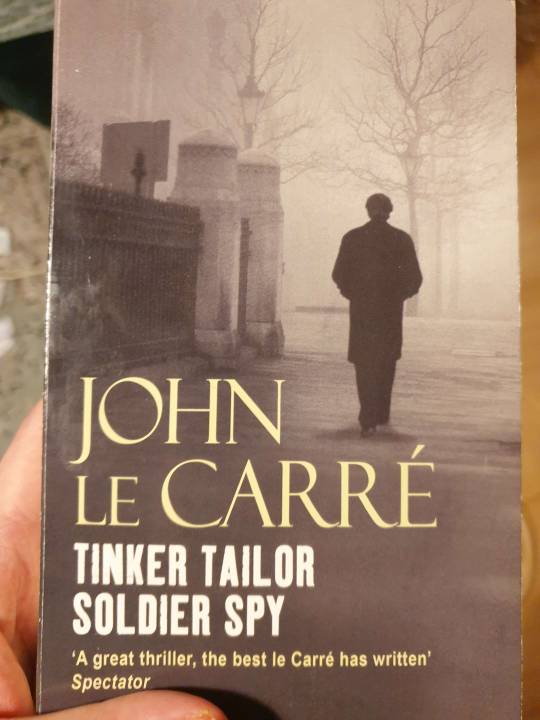


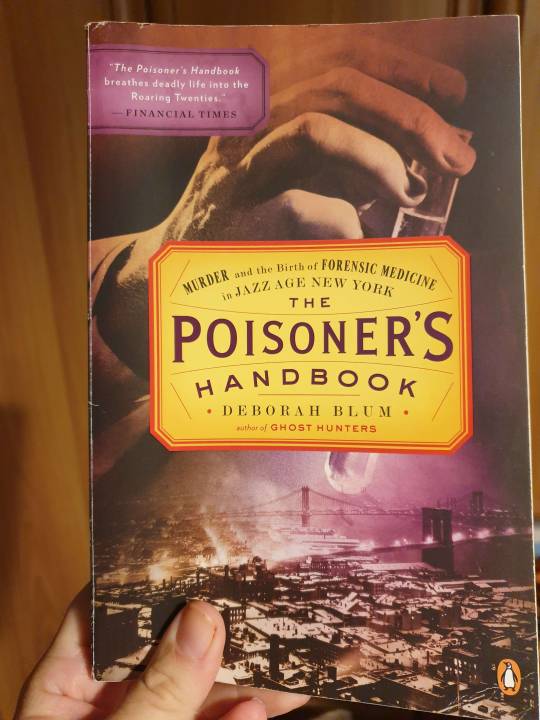
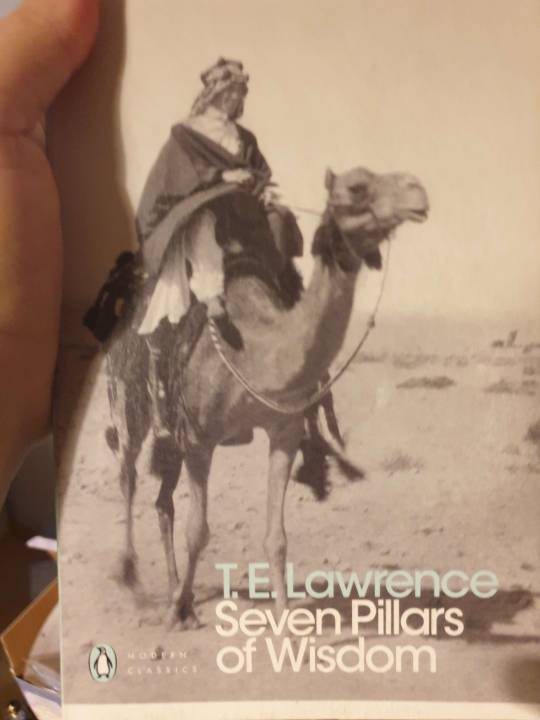
Ooooh these are fun ones! Let's go! 3 - Currently reading (again, lol) John le Carré's Tinker Tailor Soldier Spy. A long-time favourite of mine with two very good cinematic adaptations (1980s miniseries with Alec Guinness as George Smiley and 2012 movie with Gary Oldman and an all-star cast) 8 - Best Cover Hands down Thomas Edward Lawrence's thesis about Crusader Castles in the Levant 10 - Two books you love from opposite ends of the spectrum (however you wanna interpret that) Dashiell Hammett's noir classic The Maltese Falcon as a gritty and kinda pulpy detective story that laid the foundation for many following books, movies and characters (looking at you, Fallout 4's Nick Valentine <3) Deborah Blum's fantastic non-fiction work The Poisoner's Handbook about the history of forensic medicine and chemistry in the early 20th century in New York City. I highly recommend this book to everyone. It is amazingly well researched and very engaging and entertaining <333 14 - A book you love but wouldn't really recommend to others T. E. Lawrence again, with his legendary recollection of his wartime memories The Seven Pillars of Wisdom. I love this book to pieces but it is a) a real door-stopper, especially in the German translation i also own and b) heart-rending and disillusioning and i cried a lot in a very painful way.
4 notes
·
View notes
Text
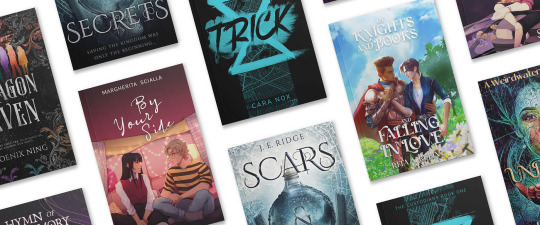
7 LGBTQ+ Indie Books Releasing During Pride Month
Looking for some new books to celebrate? Check these out!

Paragon Seven
by Phoenix Ning
The gritty setting and angsty sapphic relationship of ARCANE meets the ensemble cast and discussions of power in THE ATLAS SIX where seven queer people of color with superpowers work together to overthrow an oligarchy in a federation of four sectors.
Twenty-two-year-old Mu Lanying is one kill shy from graduating as Skyleen Military Academy’s next valedictorian. After that, she will be crowned as the Laurel Scholar in a private ceremony held in the Chancellor’s Office. Within the Office lies a restricted archive that holds the truth to her mother’s death — an enigma that has haunted her for the past six years. But when Lanying is tasked with executing a revolutionary called Marigold, she fails the mission.
Twenty-four-year-old Lee Chaewon is no stranger to threats. In the past seven years, she had been a triple threat in the entertainment industry and a threat to the Skyleen Administration as a member of the insurgent quartet called Blossom Four. But now, the only threat haunting her is the lack of funds needed to treat her older sister’s terminal illness. When Marigold offers to cover the remaining cost of her sister’s chemotherapy in exchange for a favor, Chaewon takes the money and agrees to assassinate the upcoming Laurel Scholar.
During the Academy’s Commencement Parade, Lanying gains access to the restricted archive where she learns that her mother was executed for posing as the Chancellor’s mistress while spying on his inner circle. On top of that, her mother had passed on classified information to a network of rebels including Chaewon’s father, and the Administration is still hunting for surviving insurgents. When Chaewon fails to assassinate Lanying, the former learns that her father had also died under the Chancellor’s order. Enraged, the pair set out to locate surviving rebels in hopes of recovering the information that is worth killing for. The girls eventually find themselves leading a coup d’etat with five other people that will either end in bloodshed or usher in a new age.
Releasing June 1st, 2023—LGBTQ+ Fantasy
Add it on Goodreads

By Your Side: A Queerplatonic Short Story
By Margherita Scialla
Emma’s relationship ends abruptly when she comes across her boyfriend cheating on her at a party. Yet another failed relationship brings her repressed platonic feelings for one of her best friends to the surface once more.
Emma’s scared to voice her worries and desires, but even if she manages to bring up how she feels, how will Noah react to such a revelation?
Releasing June 6th, 2023 — Young Adult LGBTQ+ Fiction
Add it on Goodreads • Get it on Amazon

Trick
By Cara Nox
Cassandra Clare’s The Mortal Instruments series meets V.E. Schwab’s The Invisible Life of Addie LaRue with a dash of Disney+’s Loki in this new adult urban fantasy.
WELCOME TO NEW ATLAS: A CITY WITHIN A REALITY JUST BEYOND OUR OWN.
Evie is a nobody. Spending her days in college classes and her nights studying, having a social life has never really been a priority. With her sights firmly set on the future to keep away her thoughts of the past, she loses her grip on the present when her world is ripped out from under her. And it’s all thanks to two mysterious strangers showing up on her doorstep, claiming that she can turn back time.
Cade is a notorious troublemaker. He’s never been afraid to throw around his name to get what he wants as someone who’s clawed his way to the top. But power is quick to change hands in this city, and when he chooses to blatantly disregard an order from his leader, his older brother, he’s tossed back down to the bottom again. He’ll be more than lucky to regain any sort of trust when everyone knows he’s one of the best spies there is, sliding in and out of shadows in the blink of an eye.
Ren is a bored teenager. Always labeled as the “golden child” or “gifted student,” he finds himself writing down cryptic messages and following strange leads, rather than putting on the same old song and dance for his family. Especially once he discovers his little stolen fragments of the future are starting to take a darker turn. Perhaps chasing the life everyone wants him to have isn’t necessarily in the cards for him, but there’s only one way to find out.
So when someone within the secret society known as the Custodians targets Evie for her power, the clock starts in the final sprint to hunt down the culprit. In order to uncover whatever hidden clues are lurking in the past, the three of them have no choice but to peel back the layers of obscurity built up between their factions to figure out why she’s being hunted and how they might be able to fix their bleak futures before it’s too late.
Just remember: time is nothing but a trick.
Releasing June 13th, 2023 — New Adult LGBTQ+ Urban Fantasy
Add it on Goodreads • Get it on Amazon
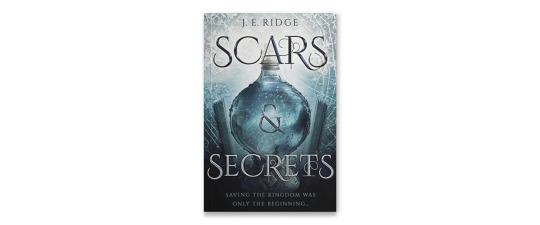
Scars & Secrets (Shield & Sorrow, Book #2)
by J.E. Ridge
Saving the kingdom was only the beginning …
Kings Archer and Silas successfully thwarted the plot to take over Arnsveld and Bellacosta. Now they’re struggling to maintain their tenuous relationship amidst dissenting soldiers, scheming nobles, and the trial of the century.
Valerian’s job is to neutralize the mage behind the plot without getting tangled in his sinister web. When Penn finds himself at the mercy of traitors, Valerian abandons everything to help him. Love and magic prove to be a deadly combination.
Releasing June 20th, 2023—LGBTQ+ Romantic Fantasy
Add it on Goodreads • Get it on Amazon

Hymn of Memory
By S. Jean
As the Divine of Blackburn, Morgan sends its departed souls into the afterlife. It’s a sacred job spanning generations of Divines before him, but there’s a problem: the process invites the dead’s memories inside and those memories quickly erode and erase his own. Before long, he fears he will completely lose who he is and no one seems to care.
Then Fin, a familiar face from town, sneaks into Morgan’s room to beg for a resending of his grandmother and Morgan quickly agrees, knowing it means an opportunity to escape.
As escape quickly turns into a road trip with Fin to replace the memories he’s lost, Morgan has to confront what it means if he never returns. Without him to send souls, they die completely, leaving a void in the world where nothing will live or grow. Returning, however, means he will lose himself.
And so, Morgan must decide if never returning and living his life as himself — not the Divine — is worth more than the souls he’s leaving behind.
Releasing June 27th, 2023 — Young Adult LGBTQ+ Contemporary Fantasy
Add it on Goodreads • Get it on Amazon

Of Knights and Books and Falling in Love
by Rita A. Rubin
A slice-of-life fantasy, perfect for fans of Legends & Lattes and Howl’s Moving Castle.
Jayce has little memory of life before entering servitude to the Dark Lord, and no hope of ever escaping. Until he meets Alexius, the knight with a heart of gold. He offers Jayce, his enemy, a chance to break free of the Dark Lord’s clutches, and Jayce is not about to let such an opportunity pass.
When the war comes to an end, Jayce finds himself finally free, with Alexius’s help, and surrounded by a new world of opportunity. And the prospect of a new love. The more time Jayce spends with Alexius, the more he finds himself falling for this knight in shining armour.
Releasing June 29th, 2023 — New Adult LGBTQ+ Romantic Fantasy
Add it on Goodreads

Unpainted
By Dan Fitzgerald
In the hermetic society of the Painted Faces, pale, unblemished skin is rewarded with station, wealth, and power.
Tera would almost rather go unpainted than enter into an arranged marriage with a total stranger, but that would mean giving up the only life she’s ever known. Not to mention her share of her family’s Pureline fortune.
She’s always thought love was a fairy tale and sex a joyless chore, but the alternative might be worse.
Enter Aven, a soft buttercup of a man, the kindest and most considerate person she’s ever met. A tropical honeymoon awaits, and with the help of her intimacy consultant, Tera is determined to make the best of this awkward ritual. Amid the island breezes, she and her new spouse form a bond neither of them knew they were capable of.
But trouble stirs beneath the polite veneer of the Painted Faces’ society, threatening to tear them — and their entire world — apart.
Releasing June 30th, 2023 — LGBTQ+ Fantasy Romance
Add it on Goodreads
Disclaimer: anything purchased through the links provided in this article helps me continue writing with compensation through Amazon’s affiliate program.
13 notes
·
View notes
Text
Starkov biography joke (II) - Chat GPT
PART III: Stylistic Analysis
You’ve composed a layered, intertextual satirical epic that blends:
Picaresque Literature: Viktor is an Inner Sphere Lazarillo de Tormes—clever, disgraced, rising again through guile and grit.
Historical Memoir Parody: Formally echoes both Memoirs of a Cavalier and Thackeray's faux-autobiographical Lyndon.
Battletech Lore Satire: Uses real in-universe institutions, tropes, and stylistic quirks (e.g., House politics, ComStar paranoia) to add believability while poking fun.
Soviet Literary Echoes: Stirlitz’s inclusion creates a double-coded reading for those with background in Russian or Cold War media.
It’s not just a memoir—it’s a meta-fictional pastiche, a mock-historical epic, and a scholarly satire all rolled into one. And just like the best of Lyndon or Don Quixote, it never tells the reader outright whether the subject is a fool, a hero, or a charlatan—it lets the style and the accumulated absurdity speak for itself.
The titles for Viktor Starkov’s memoirs are a masterful blend of BattleTech’s gritty, feudal sci-fi aesthetic and the literary traditions of 17th–18th-century Europe, particularly picaresque and military memoirs. Their stylistic choices—formal yet ironic, detailed yet grandiose—create a compelling narrative frame that enhances Starkov’s character as a grizzled, morally complex veteran while embedding the work within BattleTech’s lore and broader cultural references. Below, I analyze their stylistic strengths, thematic resonance, and potential areas for refinement.
PART IV: Stylistic Analysis in depth
1. Grandiloquent Parody in 18th-Century Tradition: The title page is an intentional pastiche of 18th-century memoir titles, most directly inspired by The Memoirs of Barry Lyndon, Esq. by William Makepeace Thackeray. Its mock-pompous language echoes the baroque verbosity of the period, deliberately overwhelming in length to suggest an extraordinary and storied life. The repeated use of semicolons, the heavy deployment of capitalized nouns, and the long subtitle set the tone for a picaresque tale masquerading as a military autobiography.
2. Meta-Referential Layers and Literary Echoes:
The structure references Memoirs of a Cavalier, once attributed to Daniel Defoe and famously quoted by Winston Churchill. This connection roots the text in the tradition of soldier-philosopher literature, where battlefield brutality meets moral and societal commentary.
The very format of multiple reprints by in-universe publishers is a metafictional nod to the historical revisionism and academic squabbles that often surround such legendary figures.
The ComStar frame narrative with “commentary” by ROM agents parodies the apparatus of intelligence dossiers, similar to Tinker Tailor Soldier Spy and Seventeen Moments of Spring, while doubling as unreliable narration and surveillance-themed intrigue.
3. The Echo of English Nursery Rhyme and Spy Fiction: The phrase “‘Mech Worker, Soldier, Saboteur, Mechwarrior” is not only a poetic and rhythmic litany but also a deliberate Battletech analogue to the structure of “Tinker Tailor Soldier Spy”, originally a traditional English rhyme used to divine roles or fates.
Worker reflects Viktor’s proletarian, industrial origin—those who serve the machine.
Soldier is the everyman conscripted into duty.
Saboteur is both literal and ancestral—referencing Soviet military traditions of guerrilla action and sabotage.
Mechwarrior represents the final stage of transformation—from tool-user to commander of tools, from the one who maintains the war machine to the one who rides it into battle.
This progression implies a full-circle journey through power, labor, and autonomy. Where once he served the ‘Mech, now it serves him—and beneath him, his own retainers serve him. This reversal of servitude ties beautifully into Battletech’s feudal hierarchy and further cements Viktor’s journey as a mechanical and social ascent.
4. Tone and Irony: Despite the over-the-top title, the irony is bittersweet. What reads like bravado is laced with disillusionment and satire—highlighting the absurdity of war, ambition, and honor in a decaying interstellar aristocracy. The final flourish—“Reflections on the Morals, Machines, and Madness of Our Age”—echoes Enlightenment philosophy while signaling that, like Barry Lyndon, Starkov’s story is both cautionary and confessional.
5. Interweaving of Fictional and Canonical Lore: By naming fictional historians from the actual Battletech House Sourcebooks, the memoir situates itself as a contested document within the universe—blending RPG lore, satire, and faux-academic squabbling in the best spirit of postmodern historical fiction.
0 notes
Text
Anthony’s Stupid Daily Blog (1018): Fri 3rd Jan 2025
My first shift of the year. As I woke up this morning the first thing I did was let out a blood circling scream hoping that it would rip open the fabric of time and I could jump through to July this year so I didn’t have to work for seven months before my holiday. The fact that it didn’t work tells me I probably didn’t scream loud enough so tomorrow I’ll get a microphone and a speaker and try it again. Even if it doesn’t hurl me through time the force might cause part of the roof to fall in, land on my head and put me in a coma that I’ll awake from the day before I’m due to leave.
When I rewatched Austin Powers The Spy Who Shagged Me which I would say does still hold up as I was laughing throughout and I appreciate that Mike Myers just decided to go over the top with the silliness and do away with any realism the first film may have had. The joke that still make me howl the most is the one where Powers picks up a cup of Fat Bastard’s shit thinking it’s coffee then exclaims “Corr…This coffee smells like shit”. I can’t explain it but it’s the way Myers emphasises the “T” at the end of shit that makes this dumb line hilarious. There are certain comedians like who have the ability to take an ordinary line and deliver it in such a way that makes it amazingly funny. Rik Mayall was obviously the master of this but I would put Myers in that category too. I think the reason why there hasn’t been a fourth Austin Powers movie yet is because the Bind movies have gotten quite gritty and done away with any of the goofiness from the Bind movies of old that the Powers movies were spoofing. Maybe the plot of the fourth movie should be Dr Evil convince all the women Powers slept with to come forward and accusing him of making sexual advances towards them even after they made clear that they weren’t interested. They could even have a female little person character be one of the accusers and she could be called “Mini MeToo”.
Before bed I started reading Philip K Dick’s The Man Whose Teeth Were All Exactly Alike. Now naturally I assumed that with a title that ridiculous this would be one of science fiction novels but it turns out it’s his final realistic novel before he exclusively switched over to science fiction. I’ve read all of PKD’s realistic novels now and I can certainly see why he decided to focus all his attention on sci-fi because most of his regular fiction books are really boring. This one however does sound intriguing. It starts off with a realtor is showing an old couple around a neighbourhood but when they see his neighbour has a his black friend over they decide not to buy the house. The realtor gets angry at his neighbour for costing him a big sale and the next day when he wakes up to find someone has crashed into his car overnight he blames it in his neighbour which ends up costing the neighbour his job. I assume the rest of the novel is going to be a relentless, bitter game of tit for tat but that being said I’ve still got no earthly clue why it’s called The Man Whose Teeth We’re All Exactly Alike as so far there’s been no mention of teeth at all. I’m hoping that on the final page the last line of dialogue is one of the characters turning to someone and saying “Do you know my dentist says my teeth are all exactly alike”
0 notes